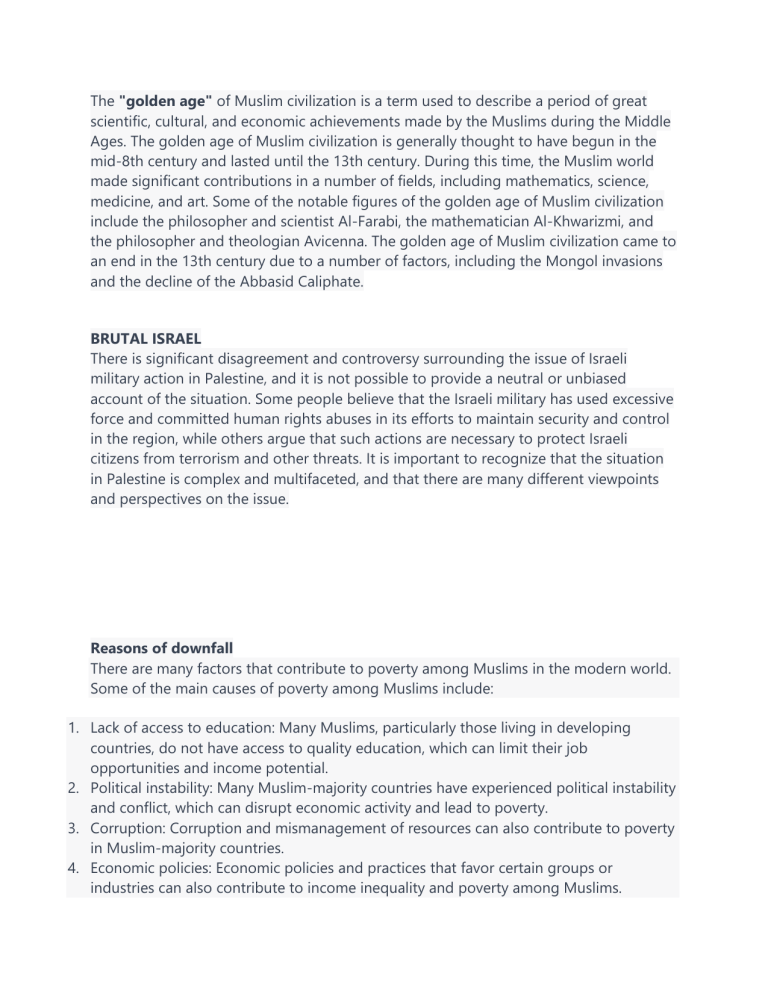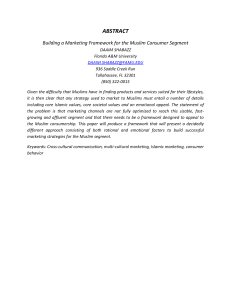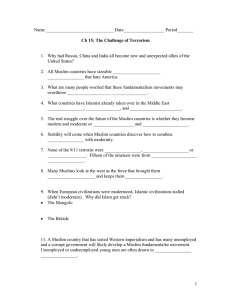
The "golden age" of Muslim civilization is a term used to describe a period of great scientific, cultural, and economic achievements made by the Muslims during the Middle Ages. The golden age of Muslim civilization is generally thought to have begun in the mid-8th century and lasted until the 13th century. During this time, the Muslim world made significant contributions in a number of fields, including mathematics, science, medicine, and art. Some of the notable figures of the golden age of Muslim civilization include the philosopher and scientist Al-Farabi, the mathematician Al-Khwarizmi, and the philosopher and theologian Avicenna. The golden age of Muslim civilization came to an end in the 13th century due to a number of factors, including the Mongol invasions and the decline of the Abbasid Caliphate. BRUTAL ISRAEL There is significant disagreement and controversy surrounding the issue of Israeli military action in Palestine, and it is not possible to provide a neutral or unbiased account of the situation. Some people believe that the Israeli military has used excessive force and committed human rights abuses in its efforts to maintain security and control in the region, while others argue that such actions are necessary to protect Israeli citizens from terrorism and other threats. It is important to recognize that the situation in Palestine is complex and multifaceted, and that there are many different viewpoints and perspectives on the issue. Reasons of downfall There are many factors that contribute to poverty among Muslims in the modern world. Some of the main causes of poverty among Muslims include: 1. Lack of access to education: Many Muslims, particularly those living in developing countries, do not have access to quality education, which can limit their job opportunities and income potential. 2. Political instability: Many Muslim-majority countries have experienced political instability and conflict, which can disrupt economic activity and lead to poverty. 3. Corruption: Corruption and mismanagement of resources can also contribute to poverty in Muslim-majority countries. 4. Economic policies: Economic policies and practices that favor certain groups or industries can also contribute to income inequality and poverty among Muslims. 5. Lack of job opportunities: Some Muslims may live in areas where there are few job opportunities, making it difficult for them to earn a sufficient income to support themselves and their families. 6. Poor infrastructure: Poor infrastructure, including lack of access to clean water, healthcare, and transportation, can also contribute to poverty in Muslim-majority countries. how to achieve success It is important for Muslims to work together and find ways to address the issues and challenges they face in a manner that is consistent with their values and beliefs. This may involve a variety of approaches, such as advocating for policy change, working to improve education and job opportunities, and building strong communities. Heroes in islamic history There have been many notable figures in Muslim history who have made significant contributions and achieved great feats. Here are a few examples of some of the most well-known heroes in Muslim history: 1. Muhammad: The Prophet Muhammad is considered the founder of Islam and one of the most important figures in Muslim history. He is revered by Muslims for his teachings and the example he set as a leader. 2. Saladin: Saladin was a Muslim military leader who is famous for leading the Muslim forces that recaptured Jerusalem from the Crusaders in the 12th century. 3. Rumi: Rumi was a 13th-century Persian poet and mystic who is widely regarded as one of the greatest poets in the history of Islam. His poetry has been translated into many languages and is beloved by Muslims and non-Muslims alike. 4. Aisha: Aisha was one of the wives of the Prophet Muhammad and is considered an important figure in Islamic history. She is known for her knowledge and contributions to Islamic scholarship, particularly in the fields of hadith (sayings and actions of Muhammad) and Islamic law. 5. Malala Yousafzai: Malala Yousafzai is a Pakistani activist and Nobel laureate who is known for her work promoting education and the rights of girls and women. She gained international attention in 2012 when she was shot by the Taliban for advocating for girls' education. MUSLIM ACHIEVEMENT IN HISTORY Muslims have made a number of significant achievements throughout history in a variety of fields. Some examples include: 1. Science and mathematics: Muslim scholars made important contributions to the fields of science and mathematics during the golden age of Muslim civilization, which lasted from the mid-8th century to the 13th century. Notable figures include Al-Khwarizmi, a mathematician who is considered the father of algebra, and Avicenna, a philosopher and scientist who made important contributions to the fields of medicine and psychology. 2. Art and literature: Muslim artists and writers have produced a wealth of beautiful and influential works throughout history. Some well-known examples include the poetry of Rumi, the intricate patterns and designs of Islamic art, and the stunning architecture of buildings such as the Taj Mahal. 3. Medicine: Muslim scholars made significant contributions to the field of medicine during the golden age of Muslim civilization. Avicenna's work in particular, including his book "The Canon of Medicine," had a lasting impact on the field and was used as a medical textbook in Europe for many centuries. 4. Technology: Muslims have also made important contributions to the development of technology. For example, the Muslim scientist and inventor Al-Jazari is credited with creating a number of important technological innovations, including the first programmable mechanical clock. 5. Exploration: Muslim explorers such as Ibn Battuta and Zheng He made significant contributions to the fields of geography and exploration. They traveled to many parts of the world and made important observations and discoveries about the cultures and people they encountered. REASON OF SUCCESS OF EARLY MUSLIMS: There are a number of factors that contributed to the success of early Muslim civilizations. Some of the main reasons for their success include: 1. Religious and cultural unity: The early Muslim world was united by a shared religion and culture, which facilitated cooperation and collaboration among the various Muslim communities. 2. Strong leadership: The early Muslim empires were led by strong and capable rulers who were able to establish stability and order, which enabled their societies to thrive. 3. Intellectual and scientific achievements: The early Muslim world was a hub of intellectual and scientific activity, and Muslim scholars made significant contributions to a variety of fields, including mathematics, science, medicine, and philosophy. 4. Economic prosperity: The early Muslim empires were economically successful, with flourishing trade and commerce. This wealth helped to support cultural and scientific achievements, as well as the construction of impressive architectural and technological projects. 5. Military might: The early Muslim empires were also militarily powerful, which helped to protect and expand their territories.




